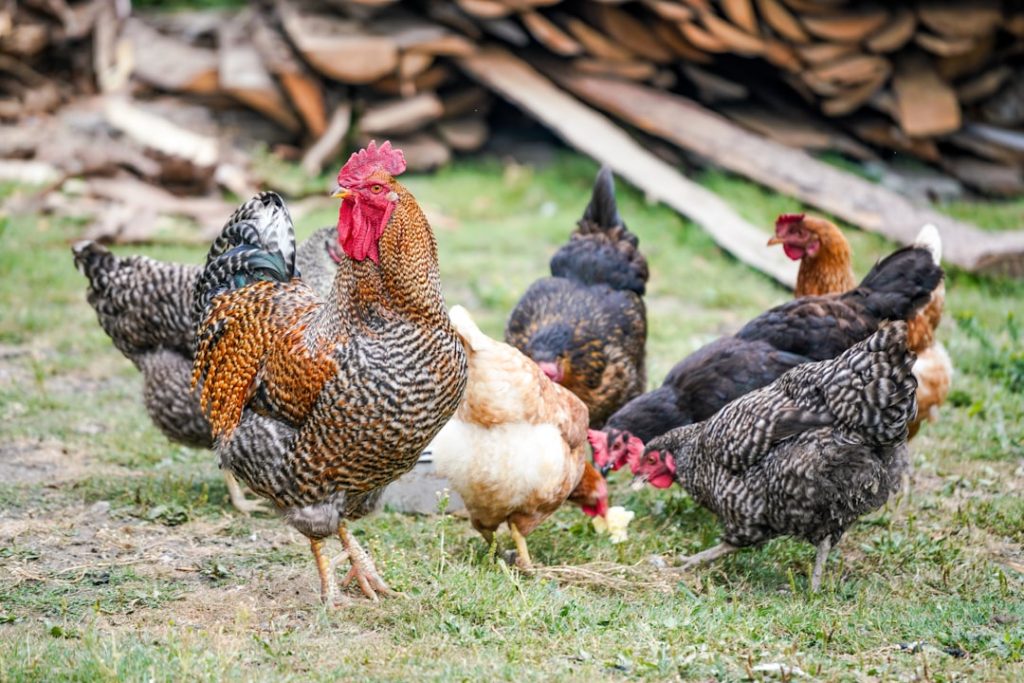Chickens are highly social creatures that naturally form flocks. They exhibit complex social structures and communicate through a variety of vocalizations and body language. Understanding chicken behavior is essential for providing an optimal environment that promotes their health and well-being.
Chickens possess several innate behaviors, including foraging for food, dust bathing, and roosting at night. Within a flock, chickens establish a hierarchical pecking order, which can potentially lead to aggressive behavior if not properly managed. Regular observation of chicken behavior allows caretakers to identify signs of stress, illness, or discomfort, enabling timely intervention and appropriate care.
These birds are naturally curious and enjoy exploring their environment. Chickens demonstrate intelligence and can learn to recognize their caretakers, often responding positively to human interaction. Creating a stimulating environment with enrichment activities is crucial for maintaining their physical and mental health.
By understanding and accommodating their natural behaviors, caretakers can foster a harmonious living space that allows chickens to express their instincts and thrive.
Table of Contents
- 1 Providing Enrichment Activities
- 2 Creating a Stimulating Environment
- 3 Rotating their Living Space
- 4 Introducing New Flock Members
- 5 Offering Nutritious Treats
- 6 Monitoring and Adjusting for Individual Needs
- 7 FAQs
- 7.1 What are some signs that chickens are bored?
- 7.2 Why is it important to keep chickens from being bored?
- 7.3 What are some ways to keep chickens from being bored?
- 7.4 What types of toys are suitable for chickens?
- 7.5 How much space do chickens need to prevent boredom?
- 7.6 Can boredom in chickens lead to health problems?
Key Takeaways
- Chickens are social animals with complex behaviors and hierarchies within their flock.
- Enrichment activities such as hanging treats, dust baths, and perches can keep chickens mentally and physically stimulated.
- A stimulating environment includes access to natural light, fresh air, and a variety of textures and materials to explore.
- Rotating their living space can prevent boredom and overgrazing, while also reducing the risk of parasites and disease.
- Introducing new flock members should be done gradually and in a neutral territory to minimize aggression and stress.
Providing Enrichment Activities
Encouraging Natural Behavior
Chickens are naturally curious and enjoy exploring their surroundings. Scatter feeding is a great way to encourage natural foraging behavior, as it mimics the experience of searching for food in the wild. You can also provide them with hanging treats or puzzle feeders to keep them engaged and entertained.
Importance of Dust Bathing
Dust bathing is an essential behavior for chickens, as it helps them maintain healthy feathers and skin. Providing a designated dust bathing area filled with sand or diatomaceous earth can satisfy this natural instinct.
Preventing Aggressive Behavior
Offering objects to peck at, such as hanging vegetables or a pecking block, can help prevent aggressive pecking within the flock. Enrichment activities not only keep chickens entertained, but also promote their physical health and mental well-being.
Creating a Stimulating Environment

Creating a stimulating environment for chickens is essential for their overall well-being. Chickens thrive in an environment that allows them to express their natural behaviors, such as foraging, dust bathing, and roosting. Providing them with a spacious outdoor area where they can roam and explore is important for their physical and mental health.
You can also create a stimulating environment by adding natural elements such as logs, branches, and rocks for them to perch on and explore. In addition to outdoor space, it’s important to provide chickens with a comfortable and secure coop that meets their needs. The coop should have adequate ventilation, nesting boxes, perches, and bedding to ensure their comfort and safety.
Adding enriching elements such as hanging treats, mirrors, or even a small wading pool can also help create a stimulating environment for chickens. By creating an environment that allows chickens to express their natural behaviors and provides them with opportunities for exploration and enrichment, you can promote their overall well-being and happiness.
Rotating their Living Space
Rotating the living space for chickens is important for maintaining a healthy environment and preventing the buildup of parasites and pathogens. By rotating their living space, you can give the soil time to rest and regenerate, which helps reduce the risk of disease and improve the quality of forage. Rotating their living space also allows chickens to access fresh grass and insects, which are important components of their natural diet.
Rotating their living space can be done by using a chicken tractor or movable fencing to create different grazing areas. This not only benefits the chickens by providing them with fresh forage, but also benefits the land by allowing it to recover from the impact of grazing. By rotating their living space regularly, you can help maintain a healthy environment for your chickens and promote the overall health of your land.
Introducing New Flock Members
Introducing new flock members to an existing flock can be a delicate process that requires careful planning and consideration. Chickens have a strong social structure and established pecking order within the flock, so introducing new members can disrupt the dynamics and lead to aggression or bullying. It’s important to introduce new flock members gradually and monitor their interactions closely to ensure a smooth transition.
One method for introducing new flock members is to use a “see but don’t touch” approach, where the new members are kept separate from the existing flock but within sight of each other. This allows them to become familiar with each other’s presence without direct confrontation. Another method is to introduce new members at night when the existing flock is roosting, as they are less likely to be aggressive in the dark.
By introducing new flock members slowly and carefully monitoring their interactions, you can help minimize stress and aggression within the flock.
Offering Nutritious Treats

Offering nutritious treats is a great way to supplement the diet of chickens and provide them with additional nutrients and enrichment. Treats such as fruits, vegetables, mealworms, or seeds can be given in moderation to provide variety and encourage natural foraging behavior. It’s important to offer treats that are safe and healthy for chickens, as well as to avoid overfeeding or providing treats that are high in sugar or salt.
In addition to offering treats, you can also provide chickens with access to fresh grass or pasture, which can provide them with additional nutrients and enrichment. Foraging for insects and plants is an important part of their natural diet, so allowing them access to fresh vegetation can help promote their overall health and well-being. By offering nutritious treats in moderation and providing access to fresh vegetation, you can supplement the diet of your chickens and promote their physical health and mental stimulation.
Monitoring and Adjusting for Individual Needs
Monitoring the individual needs of each chicken is important for ensuring their health and well-being. Chickens have unique personalities and may have different preferences or requirements when it comes to food, space, or social interactions. By observing their behavior and body condition, you can identify any signs of illness or stress and take appropriate action to address their individual needs.
Adjusting for individual needs may involve providing additional support or accommodations for chickens that are older, injured, or more vulnerable within the flock. This could include providing separate feeding areas, additional perches or nesting boxes, or even separating them from the main flock if necessary. By monitoring the individual needs of each chicken and making adjustments as needed, you can ensure that all members of your flock are able to thrive in a healthy and supportive environment.
In conclusion, understanding chicken behavior is essential for providing them with a healthy and stimulating environment. By observing their behavior, providing enrichment activities, creating a stimulating environment, rotating their living space, introducing new flock members, offering nutritious treats, and monitoring and adjusting for individual needs, you can promote the overall well-being of your chickens and ensure that they are happy and healthy members of your flock.
If you’re looking for ways to keep your chickens from being bored, you may also be interested in learning about the best location for your chicken coop. Check out this article on where to put your chicken coop for tips on creating a stimulating environment for your feathered friends.
FAQs
What are some signs that chickens are bored?
Some signs that chickens are bored include feather pecking, excessive vocalization, pacing, and aggressive behavior towards other chickens.
Why is it important to keep chickens from being bored?
Keeping chickens from being bored is important for their overall well-being and health. Boredom can lead to stress, aggression, and other behavioral issues in chickens.
What are some ways to keep chickens from being bored?
Some ways to keep chickens from being bored include providing them with a spacious and enriching environment, offering a variety of toys and objects for them to peck at and explore, and allowing them to free-range or forage for food.
What types of toys are suitable for chickens?
Suitable toys for chickens include hanging treats, mirrors, perches, and objects they can peck at such as cabbage or a hanging ball of seeds.
How much space do chickens need to prevent boredom?
Chickens need at least 2-3 square feet of space per bird in their coop, and access to a larger outdoor area for foraging and exploring.
Can boredom in chickens lead to health problems?
Yes, boredom in chickens can lead to health problems such as feather pecking, cannibalism, and reduced egg production. It can also lead to stress and a weakened immune system.
Meet Walter, the feathered-friend fanatic of Florida! Nestled in the sunshine state, Walter struts through life with his feathered companions, clucking his way to happiness. With a coop that’s fancier than a five-star hotel, he’s the Don Juan of the chicken world. When he’s not teaching his hens to do the cha-cha, you’ll find him in a heated debate with his prized rooster, Sir Clucks-a-Lot. Walter’s poultry passion is no yolk; he’s the sunny-side-up guy you never knew you needed in your flock of friends!







